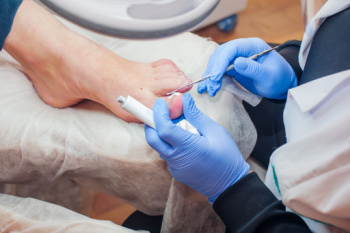(410) 764-7044
6506 Reisterstown Road, Baltimore
1205 York Road, Lutherville
6305 Belair Road, Baltimore
7809 Wise Avenue, Dundalk
Understanding Ingrown Toenail Surgery
Tuesday, 10 December 2024 00:00
An ingrown toenail develops when the edge of the nail grows into the surrounding skin, causing pain, swelling, and redness. This common condition often affects the big toe and can lead to infection if left untreated. Symptoms include tenderness, throbbing pain, and the presence of pus or drainage. The causes of ingrown toenails include improper nail trimming, wearing tight shoes, or trauma to the toe. People with certain foot shapes or conditions like diabetes may be at higher risk of ingrown toenails. Treatment options vary depending on severity. A wedge resection is a surgical procedure in which a small portion of the nail is removed to alleviate pressure. In some cases, partial toenail removal may be recommended to prevent recurrence. If you are experiencing pain from an ingrown toenail, a podiatrist can offer effective solutions, from conservative treatments to surgery. It is suggested that you schedule an appointment with this type of doctor for treatment and relief.
Ingrown toenails can become painful if they are not treated properly. For more information about ingrown toenails, contact one of our podiatrists of Plaza Podiatry. Our doctors can provide the care you need to keep you pain-free and on your feet.
Ingrown Toenails
Ingrown toenails occur when a toenail grows sideways into the bed of the nail, causing pain, swelling, and possibly infection.
Causes
- Bacterial infections
- Improper nail cutting such as cutting it too short or not straight across
- Trauma to the toe, such as stubbing, which causes the nail to grow back irregularly
- Ill-fitting shoes that bunch the toes too close together
- Genetic predisposition
Prevention
Because ingrown toenails are not something found outside of shoe-wearing cultures, going barefoot as often as possible will decrease the likeliness of developing ingrown toenails. Wearing proper fitting shoes and using proper cutting techniques will also help decrease your risk of developing ingrown toenails.
Treatment
Ingrown toenails are a very treatable foot condition. In minor cases, soaking the affected area in salt or antibacterial soaps will not only help with the ingrown nail itself, but also help prevent any infections from occurring. In more severe cases, surgery is an option. In either case, speaking to your podiatrist about this condition will help you get a better understanding of specific treatment options that are right for you.
If you have any questions please feel free to contact our offices located in Baltimore, Lutherville, and Dundalk, MD . We offer the newest diagnostic and treatment technologies for all your foot and ankle needs.




